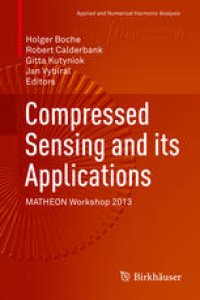
Ebook: Compressed Sensing and its Applications: MATHEON Workshop 2013
- Genre: Mathematics // Wavelets and signal processing
- Tags: Information and Communication Circuits, Signal Image and Speech Processing, Coding and Information Theory, Numerical Analysis, Linear and Multilinear Algebras Matrix Theory, Computational Science and Engineering
- Series: Applied and Numerical Harmonic Analysis
- Year: 2015
- Publisher: Birkhäuser Basel
- Edition: 1
- Language: English
- pdf
Since publication of the initial papers in 2006, compressed sensing has captured the imagination of the international signal processing community, and the mathematical foundations are nowadays quite well understood.
Parallel to the progress in mathematics, the potential applications of compressed sensing have been explored by many international groups of, in particular, engineers and applied mathematicians, achieving very promising advances in various areas such as communication theory, imaging sciences, optics, radar technology, sensor networks, or tomography.
Since many applications have reached a mature state, the research center MATHEON in Berlin focusing on "Mathematics for Key Technologies", invited leading researchers on applications of compressed sensing from mathematics, computer science, and engineering to the "MATHEON Workshop 2013: Compressed Sensing and its Applications” in December 2013. It was the first workshop specifically focusing on the applications of compressed sensing. This book features contributions by the plenary and invited speakers of this workshop.
To make this book accessible for those unfamiliar with compressed sensing, the book will not only contain chapters on various applications of compressed sensing written by plenary and invited speakers, but will also provide a general introduction into compressed sensing.
The book is aimed at both graduate students and researchers in the areas of applied mathematics, computer science, and engineering as well as other applied scientists interested in the potential and applications of the novel methodology of compressed sensing. For those readers who are not already familiar with compressed sensing, an introduction to the basics of this theory will be included.